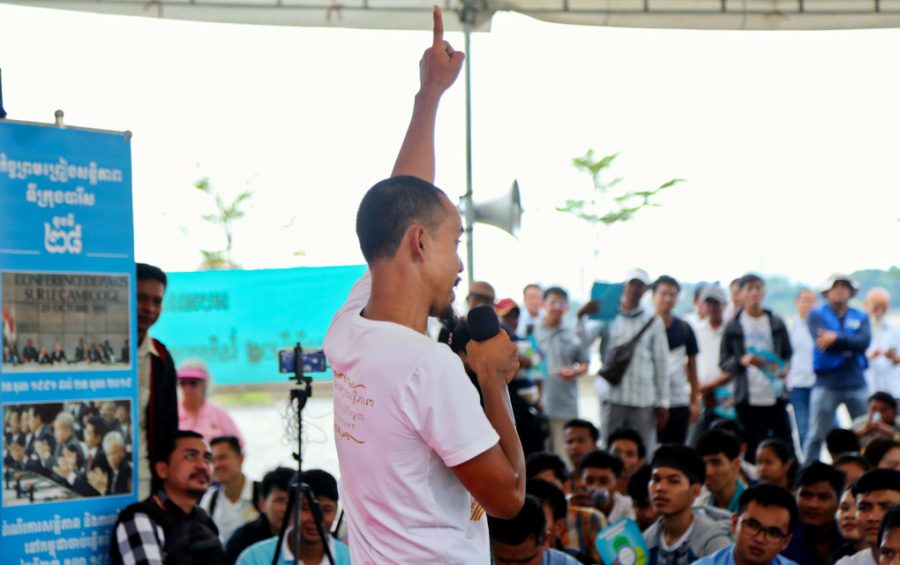Hundreds of activists gathered on Wednesday to celebrate the Paris Peace Agreements — the last time October 23 will be marked as a national holiday.
The 1991 deal ended Cambodia’s civil war of the 1980s and set up a blueprint for a multiparty democracy in the country, though the first election under the framework in 1993 ended in a dispute and hung parliament. Prime Minister Hun Sen retained power as second prime minister after his ruling CPP came second in the vote.
But in August, Paris Peace Agreements Day was chosen as one of six public holidays to be removed from the calendar to help businesses, which have long complained that, at 28 days, Cambodia had too many official days off.
On Wednesday, hundreds of civil society organization members, politicians, unionists, and workers gathered at the relocated Freedom Park, formerly in central Phnom Penh but moved in 2017 to the northern outskirts.
Moeun Tola, executive director of labor rights organization Central, said the gathering hoped to send a message to politicians to respect the spirit of the agreement, which enshrined democracy and the respect of human rights into Cambodia’s political system.
“Nowadays, they are walking far from the Paris Peace Accords, especially in regards to the respect of the law and human rights,” Tola said.
Even though it will no longer be a national holiday, he would still remember and celebrate the day in the future, he added.
“We will still hold on even though they won’t give a holiday on October 23,” Tola said.
The gathering was also attended by Phnom Penh municipal deputy governor Keut Chhe, whose forces monitored the event. U.S. Embassy Chargé d’Affaires Michael Newbill was also present.
Vegetable vendor Prum Bopha suspended her business in the morning to participate, because, she said, she wanted Cambodia to respect the rule of law and to protect people’s freedom.
“Actually, this anniversary gives warmth to people and makes them understand the meaning of what is good and what is bad,” Bopha said.
Former CNRP official Meach Sovannara told reporters at the gathering that the Paris Peace Agreements were at the root of development in Cambodia. He said all relevant parties should broadly disseminate their meaning, though the ruling party appeared to be forgetting the document’s value.
“The good thing about the Paris Agreement is that intellectuals are very familiar with it, along with the international community as signatories. They all know. The fact is that politicians who want to forget — that is their right, but they cannot change the truth,” Sovannara said.
On Tuesday, Prime Minister Hun Sen scoffed at the agreement, suggesting it had been too lenient on the leaders of the Khmer Rouge, which continued to operate into the late 1990s.
“If we were following the Paris Agreement, [we would] have to release Khieu Samphan,” Hun Sen said, referring to Democratic Kampuchea’s head of state who has been convicted of genocide by the Khmer Rouge Tribunal.
The prime minister stressed that civil war in Cambodia had continued even after the agreement. It was only, he said, his so-called Win-Win policy that brought peace to the country in 1998.
The Paris Peace Agreements cut off military aid to the Khmer Rouge. Hun Sen extended an offer to Khmer Rouge members that they would not have to stand trial should they defect.
(Translated and edited from the original article on VOD Khmer)













